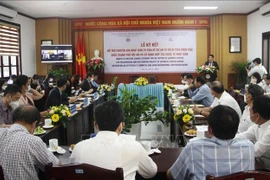The project is funded with the official development assistance(ODA) of the Government of Japan through the Science and Technology ResearchPartnership for Sustainable Development (SATREPS) Programme which is co-financedby JICA and the JST.
It will be implemented by HUST and NUT for 5 years from 2022to 2027, and considered as the development of the previous JICA-JST jointproject for “Establishment of Carbon-Cycle-System with Natural Rubber”, whichwas completed in March 2016.
Focus of the project is the development of advancetechnologies to establish a large-scale production for protein-freenatural rubber in Vietnam. Besides, new technologies for biodegradation ofrubber products and low greenhouse gas (GHG) emission and rubber production wastewatersystem with resource recovery will also be developed.
Professor Yamaguchi Takashi, team leader of the Japaneseresearchers' groups, said that the projectaims at establishing an industrial base to increase the utilisation of naturalrubber as a sustainable use of biological resources.
“Technologicalinnovation is the key for us to fight against climate crisis and we believethat this Project will set a good example of collaboration between Japanese andVietnamese research institutes in pursuing breakthrough technologies fordevelopment of sustainable products and contribution to GHG emission reduction.”said Shimizu Akira, Chief Representative of JICA VietnamOffice.
On the technical cooperation projects implementedby HUST and NUT, Associate Professor Huynh Dang Chinh, Vice-President of HUSTexpressed his gratitude to the Government of Japan for providing such avaluable support to HUST.
“This is one of ourimportant internationally joint research project which HUST has beenparticipating in preparing for implementation and I strongly believe thatworking with leading Japanese scientists from Nagaoka University of Technologywill help improve the capacity of innovation and creativity in scientific andtechnological research in general and in the field of natural rubber researchin particular for Vietnamese researchers, helping Vietnam overcome newchallenges such as achieving net zero emission target by 2050,” he said./.






























